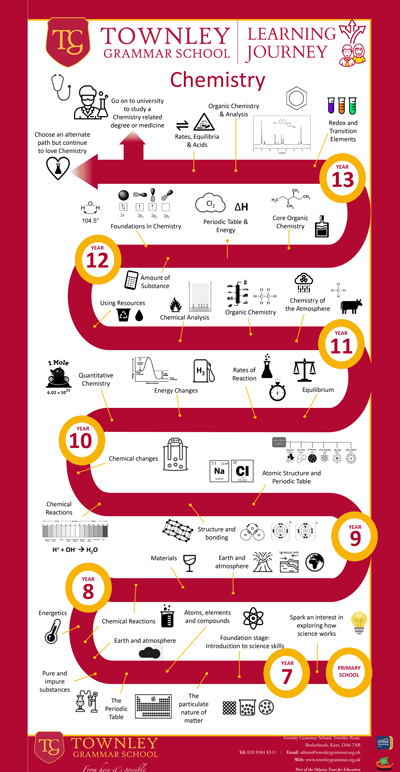- Home
- Our School
- News and Events
- Teaching & Learning
- Our Vision
- Curriculum
- Curriculum Vision
- Art
- Biology
- Chemistry
- Classical Civilisation
- Computer Science
- Dance
- Design Technology
- Drama
- Economics
- Engineering
- English Literature and English Language
- Film Studies
- Food Preparation & Nutrition
- Geography
- History
- Latin
- Mathematics
- Modern Foreign Languages
- Music
- Physical Education
- Physics
- Politics
- Religious Studies
- Sociology
- Subject Learning Journeys
- Character Education
- Townley 21c
- STEM
- EDGE
- Teaching and Learning Google Site
- Mentoring and Coaching
- Meet the Team
- Careers
- Examinations
- Professional Development
- Reporting Information
- Sixth Form
- Co-Curricular
- Pastoral
- Admissions
- Working with Us
- Contact Us
Chemistry
KEY STAGE 3 (CHEMISTRY)
At Townley Grammar School, the Science lessons we deliver in Years 7, 8 and 9 are designed to challenge and engage students, develop their practical and problem-solving skills and demonstrate the real-world applications of the topics they have studied. We have recently refreshed all of our schemes of work to reflect the new National Curriculum requirements, introducing a number of new resources and activities.
In Years 7-8, students will typically have two double lessons (100 minutes each) of Science every week, usually taught by teachers with different specialisms, while the third subject is shared. Students appreciate the differences between the topics taught in Biology, Chemistry and Physics from early in Year 7, by the use of clearly identified topics, separate textbooks (the Longman 11-14 range) and exercise books for each subject.
Year 9 is a transition year where all students continue topics covered in the national curriculum as well as covering some materials from the GCSE course to stretch our students.
Each topic is assessed using both low stakes testing and end of unit tests throughout years 7 to 9.
Key Stage 4 Chemistry (GCSE)
The GSCE chemistry specification is designed to help students understand how to formulate a scientific approach to understanding and explaining the world and solving problems. This means that the 'How Science Works' approach is integrated throughout the specification.
The specification is structured in a way that starts with the fundamental ideas in chemistry, putting the building blocks in place. This enables students to develop an understanding of topics such as chemical structures and their properties, chemical reactions and how to analyse substances. The key themes studied at years 10 and 11 are:
- the nature of substances and how they react together
- how Chemistry is used in business and industry
- how our use of raw materials in fuels and manufacturing can affect the global and local environment
Throughout the course practical work is used to develop students' skills in a way that helps understanding of theory and brings the subject alive in the classroom.
The course is suitable for all students regardless of whether or not they intend to carry on studying science. It also provides opportunity for progression, so that students have the best preparation for studying A-level chemistry.
At Townley Grammar all students are entered for the AQA specification 8462. The subject content is split up into 10 main topics that are taught include
Summary of Content
- Topic 1 - Atomic structure and the period table
- Topic 2 - Bonding, structure and the properties of matter
- Topic 3 - Quantitative chemistry
- Topic 4 - Chemical changes
- Topic 5 - Energy changes
- Topic 6 - The rate and extent of chemical change
- Topic 7 - Organic chemistry
- Topic 8 - Chemical analysis
- Topic 9 - Chemistry of the atmosphere
- Topic 10 - Using resources
Assessment Structure
The qualification is linear, in that all the examinations occur at the end of year 11. The required practical content and all ten topics studied are assessed over two written examination papers. Paper 1 includes questions assessing knowledge and understanding from Topics 1-5 and Paper 2 includes questions assessing knowledge and understanding from Topics 6-10. Both papers are 1 hour 45 minutes long worth 100 marks. Questions on each paper include multiple choice questions, (MCQ), structured, closed short answer and open-response questions.
Key Stage 5 Chemistry (A Level)
The principles of Chemistry underpin so many aspects of the world in which we live. It makes sense of current events such as climate change, pollution, and technology. This course gives students an exciting insight into the contemporary world of chemistry in a range of different contexts, discovering the impact it has on industry and many aspects of everyday life. Key concepts of chemistry and practical skills are integrated throughout the two year years of study, with a combination of academic challenge and practical focus.
A separate endorsement of practical skills is taken alongside the A level, where students carry out a range of practical activities in lessons, to demonstrate mastery of these skills. The course content is split into six modules which is taught by two different teachers; one covering the organic content and the other covering the physical content, leading to three written exams at the end of the course.
Course Requirements
In order to study chemistry, you need minimum of a 7 in GCSE Chemistry (or a minimum of 7/7 in combined science).
Skills
Chemists require good analytical, practical and problem-solving skills. You will need the ability to communicate scientific ideas and concepts, as well as being able to be logical, analyse and interpret data. To succeed in Chemistry A level, strong maths skills are crucial, although studying A level Maths is not necessary.
Chemistry A level is a well-recognised and respected course of study. It is a required subject for students considering careers in the health and clinical professions, including medicine, veterinary science, nursing, dentistry and forensic science. Studying Chemistry will also prepare students for industry careers, such as those within the pharmaceutical or petrochemical sectors.
Resources
Chemistry is taught at Townley Grammar by a team of well qualified and experienced chemistry subject specialists, who have a strong passion for their subject. Teaching mixes a range of practical, theoretical, research and problem solving approaches to provide students with a range of skills in well-equipped laboratories.
All students follow the OCR Chemistry A specification (H432)
Year 12 Chemistry Overview
- Module 1: Development of practical skills This module underpins the whole of the specification, and covers the practical skills that students should develop throughout the course. The practical skills in this module can be assessed within written examinations and within the Practical and Endorsement
- Module 2: Foundations in Chemistry Atoms, compounds, molecules and equations, Amount of substance, Acid-base and redox reactions, Electrons, bonding and structure
- Module 3: Periodic Table and Energy The Periodic table and periodicity, Group 2 and the Halogens, Qualitative analysis, Enthalpy changes, Reaction rates and Equilibrium.
- Module 4: Core Organic Chemistry Basic concepts, Hydrocarbons, Alcohols and Haloalkanes, Organic synthesis, Analytical techniques (IR, MS).
End of Year Examinations in the summer term
The two examination papers consist of multiple-choice, structured questions and extended response questions.
Year 13 Chemistry Overview
The course content and assessment are shown below:
- Module 1, 2, 3 and 4 as in year 12
- Module 5: Physical Chemistry and Transition Elements Reaction rates and equilibrium (quantitative), pH and buffers, Enthalpy, entropy and free energy, Redox and electrode potentials, Transition elements
- Module 6: Organic Chemistry and Analysis Aromatic compounds, Carbonyl compounds, Carboxylic acids and esters, Nitrogen compounds, Polymers, Organic synthesis, Chromatography and spectroscopy (NMR).
Examination Papers
- Paper 1: Periodic Table, Elements and Physical Chemistry - Multiple choice, structured and extended response (100 marks) 2 hr. 15
- Paper 2: Synthesis and Analytical Techniques - Multiple choice, structured and extended response (100 marks) 2 hr. 15
- Paper 3: Unified Chemistry - Structured questions and extended response (70 marks) 1 hr 30
- Non-exam assessment – Practical endorsement for Chemistry.




